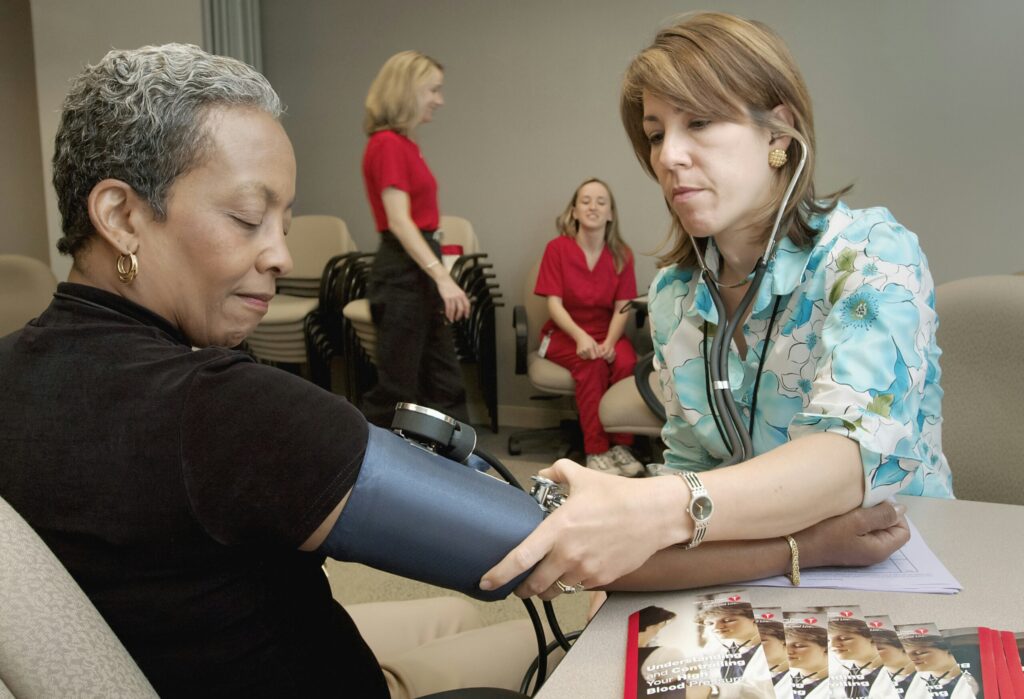
Many women worry about risk factors for uterine fibroids, especially we still haven’t pinpointed the exact reason why these benign tumors develop. But now, thanks to a new study, we do know that treating high blood pressure could lower your risk for developing fibroids in the future. Here’s what you need to know.
According to a new study in JAMA Network Open, there is a connection between your risk for adverse cardiovascular events and your risk for developing uterine fibroids. In turn, they discovered that you could reduce fibroid risk by treating high blood pressure with medication. (The fibroid risk was only reduced for women who already had high blood pressure.)
To reach these findings, study authors followed the health of more than 2500 women between the ages of 42 and 52. In examining their overall health following diagnosis for up to 18 years following study enrollment, via the Study of Women’s Health Across the Nation, authors compared the outcomes of women with high blood pressure to those of women in the general population.
In total, throughout the study period, 526 women (or about 20% of participants) were newly diagnosed with at least one uterine fibroid. And they noted that women with untreated hypertension (the medical term for high blood pressure) were 19% more likely to develop uterine fibroids than other women. Luckily, women could lower their risk for developing uterine fibroids by treating their hypertension—by as much as 37%! Interestingly, the treatment choice mattered as well. Researchers noted that taking an ACE inhibitor lowered women’s fibroid risk by an astonishing 48%.
Now, while these findings are important for women with hypertension, we still can’t say that blood pressure medications can actually prevent fibroid development. And, while medications like ACE inhibitors may lower fibroid risk for women with hypertension, they can cause other side effects, including decreases in your heart rate as well as blood pressure that falls too low. As such, taking ACE inhibitors simply to reduce your future fibroid risk would not be recommended.
So, what can you do to address your fibroid risk without medication? Remember, there is never a guaranteed way to prevent fibroid development. But we can focus on other risk factors for fibroids such as your weight, in order to reduce your risk naturally. Some women find that reaching and maintaining a healthy weight via diet and exercise can reduce their tumor risk. Or, if they’ve already developed fibroids, these measures may help you manage symptoms while you explore your treatment options.
Yet, even with such careful lifestyle changes, your family history and race can still impact your fibroid risk: while we don’t know why, Black women are three times more likely to develop these tumors than Caucasian women. As such, focusing on prevention may not be enough to provide relief from symptoms such as heavy bleeding, pelvic pain and enlargement of the uterus. Instead, you’ll need to explore medical treatment to shrink your fibroids and relieve your symptoms. Luckily, though, you can do so without undergoing a surgical procedure!
At Houston Fibroids, our interventional radiologists perform a procedure called Uterine Embolization (UFE.) It helps shrink uterine tumors by reducing blood flow to the uterine artery, effectively starving the fibroids without the need to remove them surgically. Many women prefer this minimally invasive treatment to options such as myomectomy or hysterectomy, because it allows them to avoid overnight hospital stays and general anesthesia. Plus, the UFE recovery period is shorter and less intense when compared to post-surgical experiences.
Ready to see if you’re a candidate for UFE in Houston? Our experts are available to provide a consultation. Just click here to request an appointment !
As leading fibroid specialists in Houston, we can help you get back to doing the things you love – free of pain and symptoms associated with this diagnosis.

Scheduling
Please contact our dedicated specialists to schedule a consultation today.
2025 Houston Fibroids. All rights reserved. Website Design by Healthcare Success